
Reindeer caravan
N 51°33'336'' E 099°15'341''
Day: 178-180
Sunrise:
09:19/09:17
Sunset:
17:46/17:49
Total kilometers:
1281
Soil condition:
Ice, snow
Temperature – Day (maximum):
minus 15°C
Temperature – day (minimum):
minus 20°C
Temperature – Night:
minus 35°C
Latitude:
51°33’336”
Longitude:
099°15’341”
Maximum height:
1981 m above sea level
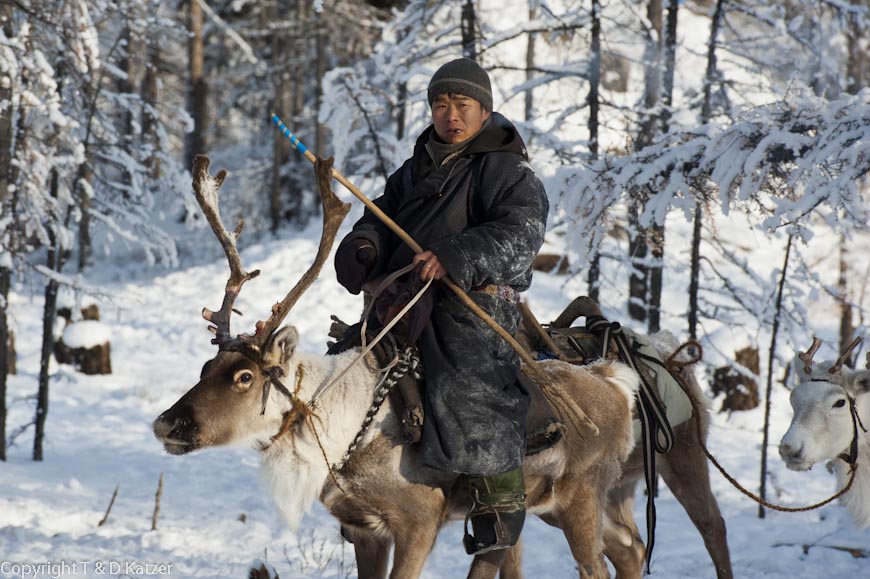
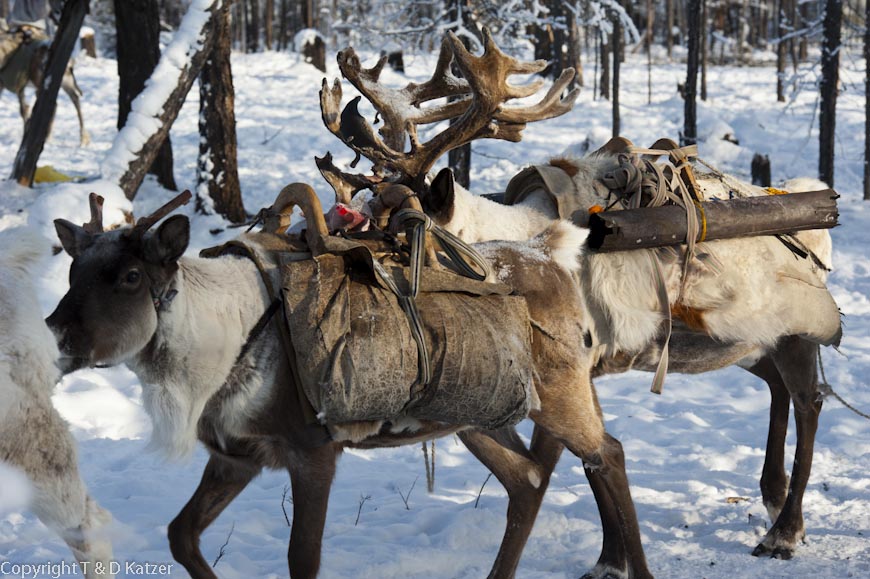
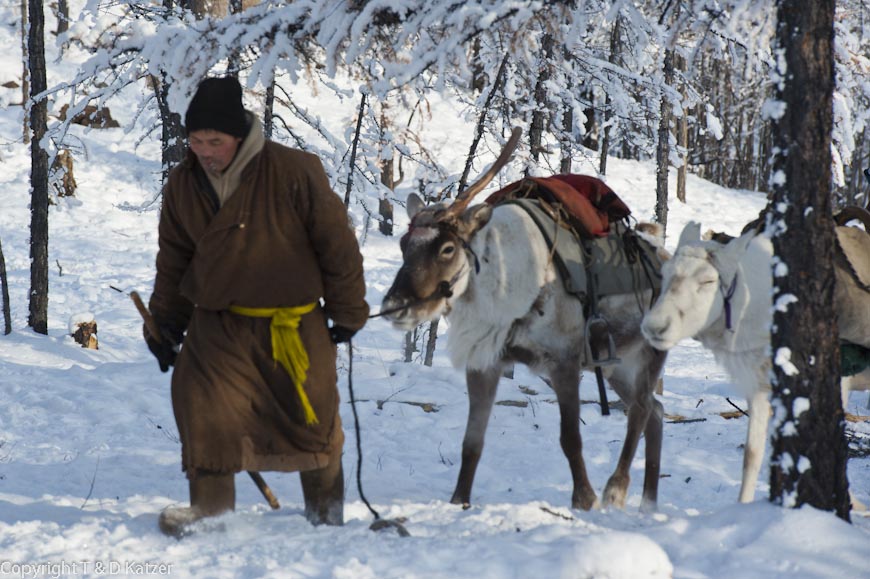
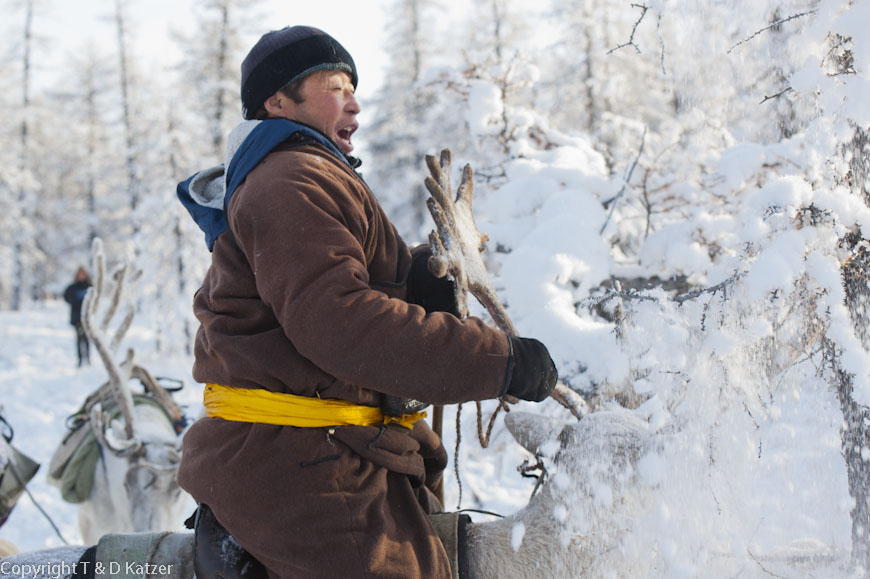
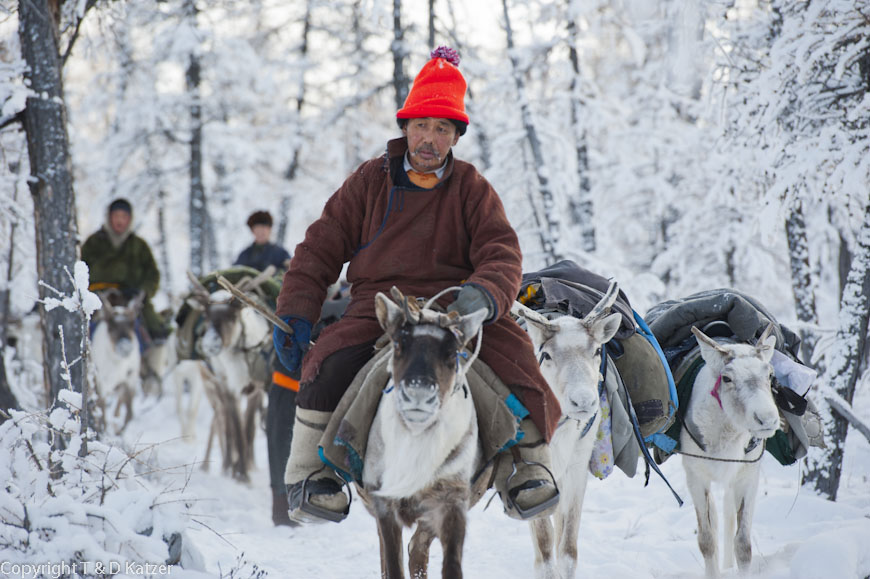
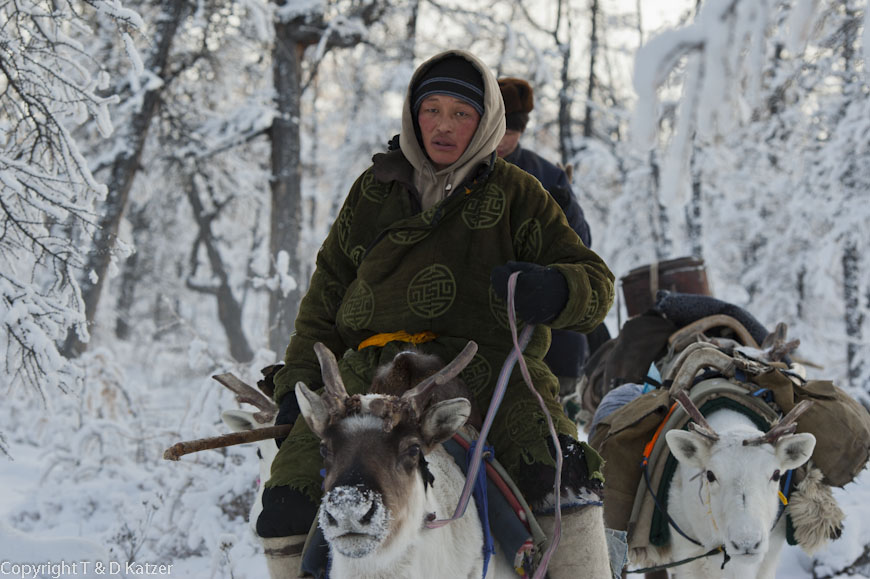
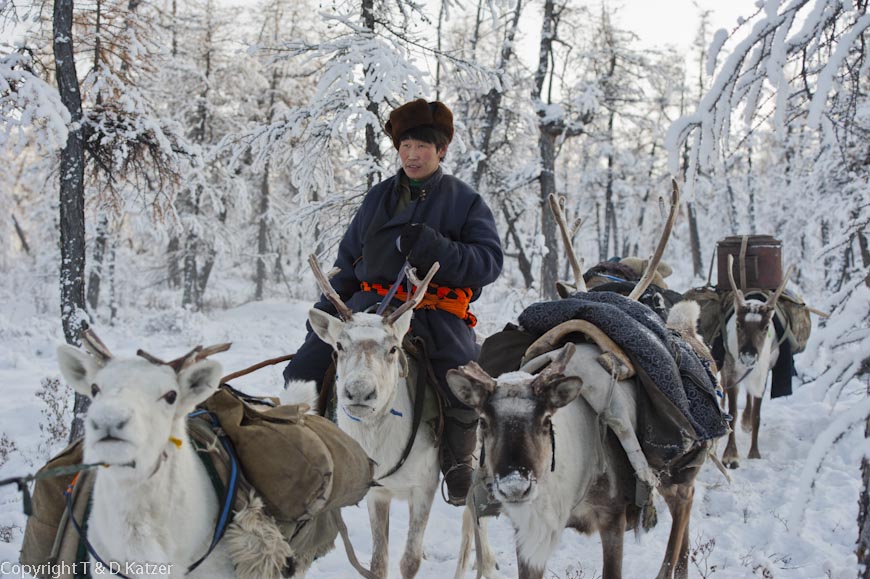
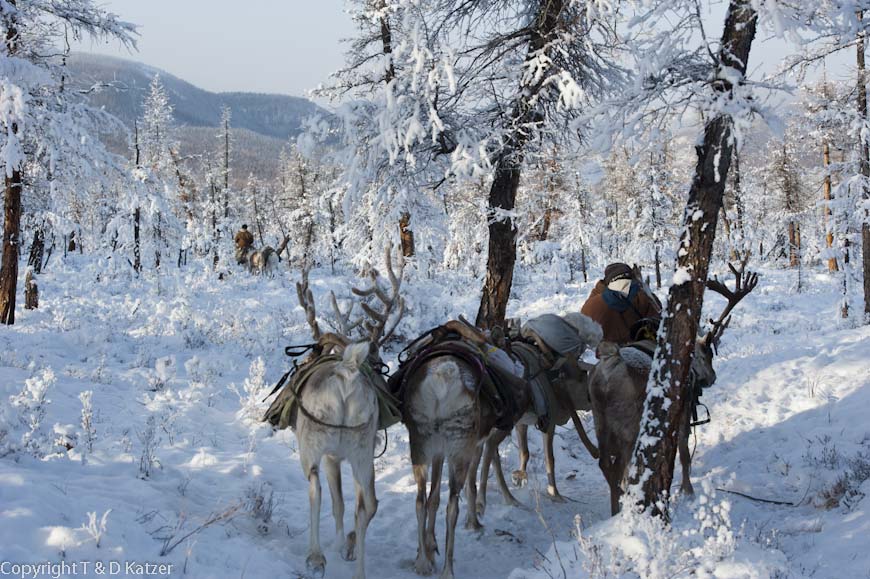
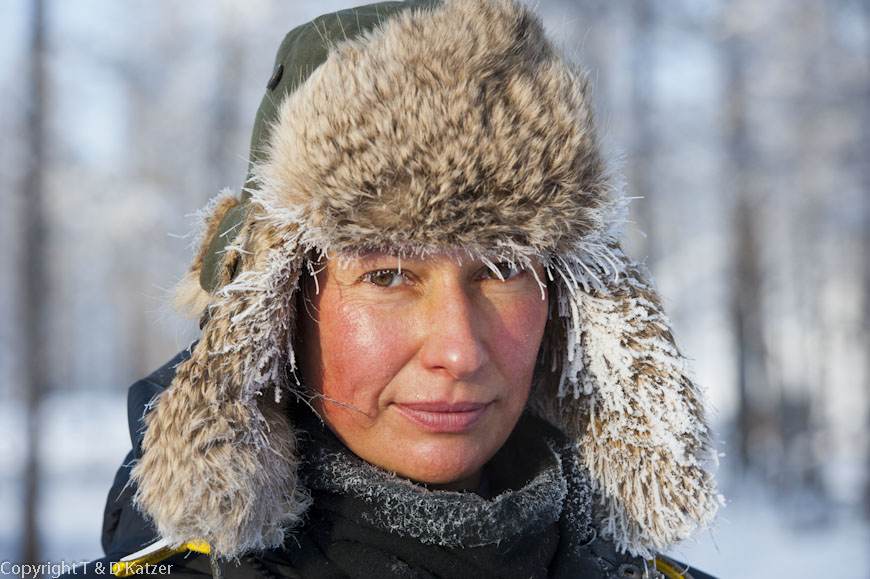
Yesterday a group of Tuwa men came to the camp, who mainly live with their families in Tsagaan Nuur during the winter. Once a winter, all the men come together to ride their reindeer to a remote valley where the main herd is located. Due to the constant risk of losing reindeer to wolves, it is important to check the condition of the herd. “Can’t the animals cross the border into Russia in search of food? That would be fatal, wouldn’t it?” I ask. “There is enough food in this valley. What’s more, the mountains to the left and right are so high that they act as a natural barrier. Reindeer wouldn’t walk over them like chamois. No, we are not afraid of losing them through migration. But wolves are a big threat. We lose animals to wolf attacks every year. Maybe we’ll build a natural fence. That will stop the wolves from getting into the valley,” explains Shagai. “A natural fence?” I wonder. “Yes, we clear trees and branches at the end of the valley. That keeps the reindeer in the hollow and the wolves from getting in, as a rule.” “Is it that easy to scare off wolves?” I ask. “Well, in that respect, wolves are stupid. When they reach a barrier and see no reason to break through it, they turn back,” I hear and wonder whether this statement is based on a translation error or whether wolves are really so easily deterred from their prey?
“Denis, come quickly! The men are about to leave!” calls Tanja. I put on my shoes, slip into my down jacket, grab my camera and hurry outside. In fact, the reindeer are already loaded and ready to go. “Tsaya wanted to let us know when we were leaving, didn’t she?” I wonder aloud, as I would have missed the departure by a hair’s breadth. “She’s probably forgotten,” says Tanja as the first Tuwa leave the camp. We rush after them to witness the rare spectacle of a reindeer caravan. Wrapped up in their deels, felt boots, hats and gloves, the men pull their animals behind them. Each of them has saddled one of the reindeer and loaded the others with blankets, furs, spare clothes, food and even a tin stove and stovepipe on one of them.
The twelve men will be on the road for 10 to 14 days during the coldest time of the year. Just a hundred meters behind the camp, the first of them climb into the saddles. The speed of the reindeer is astonishing. We hardly get a chance to take any photos, running and panting through the snow alongside the group, which is quite unconventional to look at. The Tuwa laugh and wave to us in a friendly manner. Each of the men has between three and five animals with them, which are now trotting light-footedly along the narrow path. It is an easy descent down the mountain. On an open plateau, all the riders gather to form a caravan of around 50 reindeer. After 40 minutes we reach the open snowy area. A graceful looking plateau, framed by rough icy mountains. Only a narrow track, trodden by 200 reindeer hooves, runs through the snow and disappears a few hundred meters on the other side of the clearing in the taiga. “They’re gone,” I snort out of breath. “Yes, that’s a shame. They’re just too fast,” Tanja replies. “It would be a great adventure to accompany this troop,” I say thoughtfully, catching my breath. “At minus 30°C to minus 45°C, I’d rather you stay with me in the yurt.” “You’re probably right,” I reply. As we start our way back, the sun has hidden behind one of the many mountains. The shadows are getting longer and their darker and darker foothills are reaching for us. A light wind picks up, causing the fine icy crystals to swirl through the freezing cold. We retreat into our down jackets and trudge up the hill to the Tuwa camp.
A lone rider leads his horse and packhorse across the square in front of our yurt as we reach our felt house again. The man barely pays us any attention, gets out of the saddle and ties up his mount in front of Gamba’s hut. We learn that, despite the winter, he roams the woods in search of the expensive jade stone.
Tsaya visits us in the evening. “I hope nothing happens to my Ultsan out there,” she says worriedly. “He’ll definitely come back safe and sound,” I comfort her. “Yes, but it’s dangerous. You can easily freeze to death in these temperatures,” she says. “He’s experienced and in the best company,” I say to ease her dejection. “Oh, if only I had our dear dog. He could comfort me in the loneliness of the coming days,” she laments. “What’s wrong with your dog?” Tanja wants to know. “We gave him to Ultsan’s brother. A Mongolian friend of his wanted to take him hunting. He promised us that he would look after him and bring him back unharmed. When they spent a night in Ulan Bator, he supposedly ran away,” she says sadly. “How so supposedly?” I ask. “Ultsan and I think they sold him. You can get up to two million tugrik (€1,143) for a good hunting dog in Ulan Bator.” “You mean Ultsan’s brother actually sold your dog? That’s terrible,” I say. “The brother is a good-for-nothing. Always hangs out with the wrong people and has a drinking problem,” she explains. “So why did you give him the dog?” I wonder. “Oh, we thought he was speaking the truth this time. I guess not. Ultsan has threatened his brother that he won’t be seen without his dog,” she says with a deep sigh.
“By the way, a Russian satellite is supposed to come down here tonight,” she changes the subject. “What, where? Here in this region?” I ask. “Yes. Somewhere around Tsagaan Nuur the thing should land.” “Well, hopefully not in our camp,” jokes Tanja.
The next day we find out that the satellite has actually made a small crater in the middle of the Tsagaan Nuur road.
We look forward to your comments!

